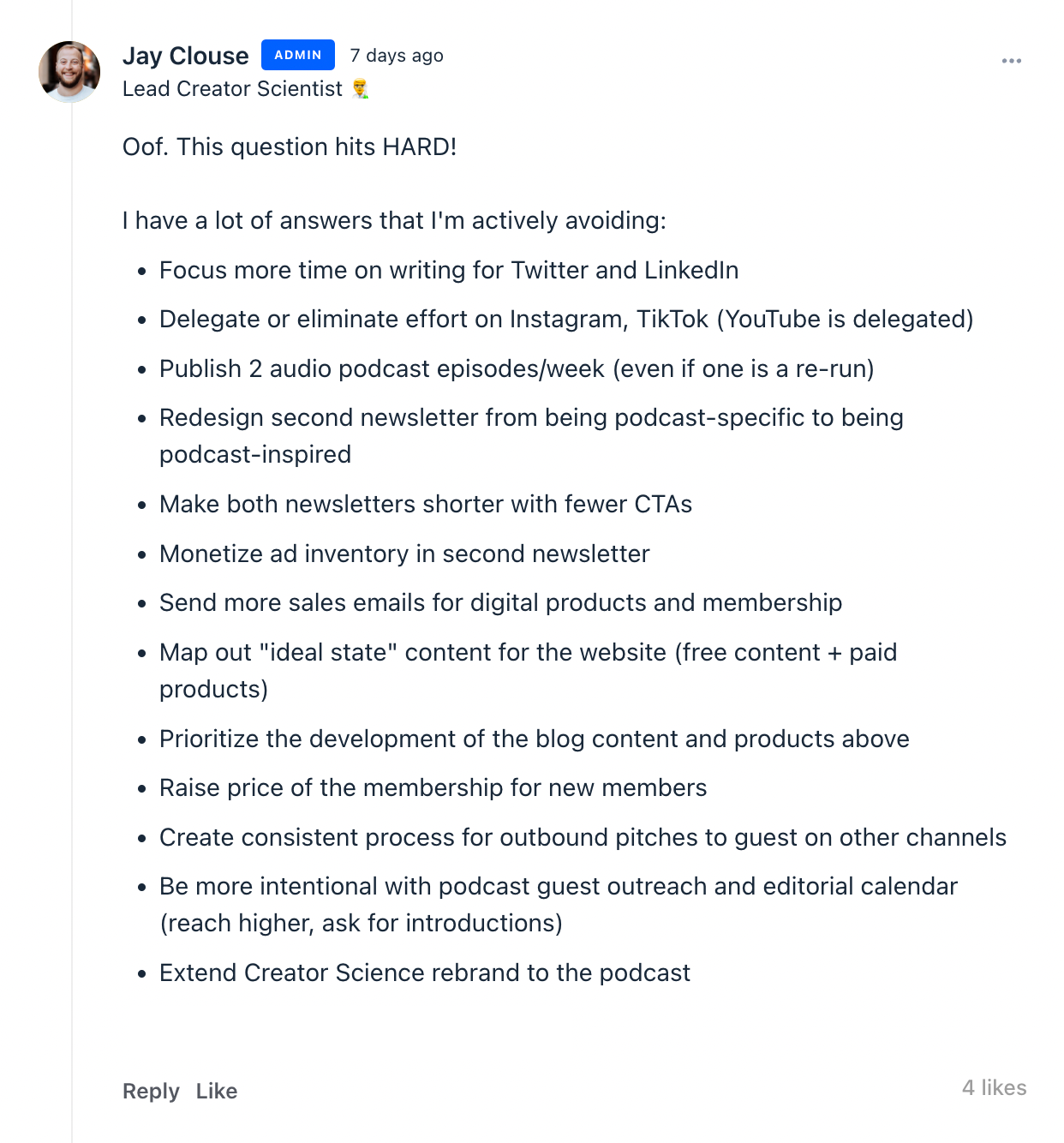Inside The Lab this week, Cat Mulvihill shared a question that hit me like a ton of bricks.
Here's what she said:
I was recently reminded of a technique the former CEO of Intel (Andy Grove) would use for making business decisions: "If I were replaced tomorrow, what would my successor do?"
I believe this one question can illuminate so much about your business since it gives you some distance and perspective that's not always easy to find when you are "in it" day-to-day.
It's similar to when you know you are about to get feedback from a coach or peer about your business (or website, or YouTube channel, or social media, etc). Suddenly you look at your business through the eyes of an outsider.
This is such a useful exercise.
It's so common that even when we are skilled at something, we find ourselves helping others to do that thing and forgetting to apply that same skillset and lens to ourselves.
"The cobbler's children have no shoes."
We're so close to our own work that sometimes we refuse to see (or at least refuse to act on) the obvious improvements right in front of us.
So I made a list. What would my successor do if they were suddenly in charge of my creator business?
I'd encourage you to pause reading right now and make your own list.
Unfortunately for me, my list got pretty long pretty quickly.

Shortly after sharing my list, Cat asked a great follow-up question that got me thinking even deeper:
How much on this list is being avoided from a technical challenge standpoint (not having the time, resources, or a missing skillset) vs an adaptive challenge (you have the time, resources, and skills, but still don't take action).
So I broke my list down even further into categories for WHY I'm actively avoiding some of these items. I identified three different main reasons for why I'm avoiding things that I logically know are a good idea:
- Lack of resources (I can't do this due to lack of time, money, or technical ability)
- Lack of interest (I don't want to do this)
- Fear (I'm afraid to do this)
Look back at your own list and categorize it. Those things you're actively avoiding – why are you avoiding them?
Here's what my break down looks like:
Resource-based avoidance
- Delegate or eliminate effort on Instagram, TikTok
- Publish 2 audio podcast episodes/week
- Redesign my second weekly newsletter from being podcast-specific to being podcast-inspired
- Monetize ad inventory in my second weekly newsletter
- Map out "ideal state" of the content for Creator Science (free content + paid products)
- Prioritize the development of the blog content and products above
Interest-based avoidance
- Focus more time on writing for Twitter and LinkedIn
- Make both newsletters shorter with fewer CTAs
Fear-based avoidance
- Send more sales emails for digital products and membership
- Raise the price of the membership for new members
- Create a consistent process for outbound pitches to guest on other channels
- Be more intentional with podcast guest outreach and editorial calendar (reach higher, ask for introductions)
- Extend Creator Science rebrand to the podcast
Now that you have your avoidances categorized, so what?
For me, each of these categories has their own solution.
For resource-based avoidance, I'll prioritize and overcome those resource constraints. If it's a lack of time, I could hire someone to help. If it's a lack of money, I'll start budgeting to save that money. If it's a technical ability, I would budget time to acquire that skill or delegate it to someone else.
Interest-based avoidance is the easiest answer. Being a creator is a long game, and you win long games by making sustainable decisions. Expecting yourself to do something that you aren't interested in isn't sustainable. So, for this category, the answer is to let yourself off the hook or once again hire and delegate.
Fear-based avoidance is an easy answer but difficult to conquer. Fear-based avoidance means that you have the resources to do the thing(s) you know you should do...but you're afraid to pull the trigger. I wish I could say the solution here is just snapping your fingers and getting over the fear – but it's just not that easy.
To overcome fear, I think you need to acknowledge the fear. First to yourself and then slowly acknowledging it to others. When you expose fear to the air, it starts to lose its power a little bit. And often, people close to you will help you see that fear in a different way.
For me, fear-based avoidance is what I will try and accomplish first because the hurdle is totally mental. If I take them one at a time and make the uncomfortable decision to push through that fear, it will make overcoming fear on the other goals easier.
I know this is a difficult exercise. More difficult emotionally than procedurally. But being able to step back and look at your business objectively from time to time is really important.
We can get so caught up in the day-to-day that we feel busy – we feel like we have forward motion – but we lose sight of moving forward to where? You may zoom out to realize that you've been moving in the WRONG direction.
So, if you haven't been doing this exercise as you read through this, take a few minutes to do it now.
If you were replaced tomorrow, what would your successor do?
If you need some accountability, share your list in the comments below. If you need some privacy, shoot me an email. I'd love to hear from you.


Join 54,000+ creators learning from firsthand experiments, expert interviews, and actionable advice every week.